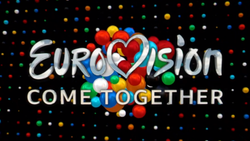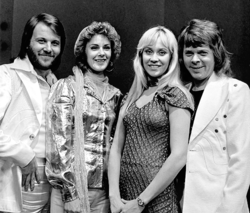Eurovision: Come Together
| Eurovision: Come Together | |
|---|---|
 | |
| Dates | |
| Final | 16 May 2020 |
| Host | |
| Venue | Television Centre, London, United Kingdom |
| Presenter(s) | Graham Norton |
| Directed by | Stephen Neal |
| Executive producer |
|
| Host broadcaster | BBC |
| Participants | |
| Number of entries | 19 |
| Vote | |
| Voting system | 100% online voting |
| Winning song | "Waterloo" by ABBA |
Eurovision: Come Together was a one-off television programme, organised and broadcast by the BBC, to determine the most popular song in the history of the Eurovision Song Contest, as voted for by the British public. Hosted by Graham Norton, the show was broadcast from Television Centre, London on 16 May 2020, and served as an alternative for the Eurovision Song Contest 2020, which was cancelled due to the COVID-19 pandemic. Nineteen past Eurovision entries, chosen by an assembled jury, took part in the event, with the winner determined by online voting. It was won by the winning song of the 1974 contest, "Waterloo", originally performed by Swedish group ABBA.
Background
[edit]The Eurovision Song Contest 2020, which was planned to be held in Rotterdam, Netherlands on 12, 14 and 16 May 2020, was cancelled on 18 March 2020 by the contest organisers, the European Broadcasting Union (EBU) and the Dutch host broadcasters NPO, NOS and AVROTROS, following the outbreak of COVID-19 in Europe.[1][2]
As part of a wide range of new programming commissioned following the cancellation of several arts and entertainment events as a result of the pandemic, the BBC announced on 24 March 2020 that it would commission a special Eurovision broadcast, titled Eurovision: Come Together.[3][4][5] The special would be produced by BBC Studios for BBC One, and feature past Eurovision performances from throughout the years, interviews, and a display of what had been anticipated for the 2020 contest.[3]
The EBU, NPO, NOS and AVROTROS later confirmed that they would organise an official replacement programme to the 2020 contest, entitled Eurovision: Europe Shine a Light and broadcast live from Hilversum on 16 May 2020, the day on which the final would have taken place.[1][6][7] Initial reports suggested that the BBC would air Eurovision: Come Together on BBC One at the same time, with Europe Shine a Light being offered to UK viewers instead through BBC iPlayer.[8] The BBC programming schedule for Eurovision, released on 1 May 2020, confirmed that Europe Shine a Light would be broadcast live on BBC One, with Graham Norton providing commentary, and that Eurovision: Come Together would be shown immediately before.[9][10] This press release also confirmed that Eurovision: Come Together would give viewers the opportunity to take part in a live vote.[9]
Selection process
[edit]
The shortlist of competing entries for the competitive aspect of the programme was determined by a group of assembled individuals with a connection to Eurovision. The membership of the panel included British broadcasters and journalists, former UK Eurovision contestants, as well as members of the Eurovision fandom and contributors to Eurovision fansites.[11][12][13][14]
Panelists were asked to select ten Eurovision songs from the history of the Eurovision Song Contest, including all songs that had taken part in the contest before 2020. Any entries which were to have competed at the 2020 contest were ineligible. The criteria against which the panelists were asked to rate the entries outlined that the songs selected should be "modern day classics" that "have stood the test of time", taking into account the performance, including live vocals and staging, and song composition. Any entry in which an individual panelist was involved in its original performance, either directly as singer or songwriter, or in a behind-the-scenes role, such as vocal coach or publicist, was ineligible for selection by that panelist.[14][15]
The selection panel consisted of the following 18 members:[15]
- Rylan Clark-Neal – UK semi-final commentator
- Scott Mills – UK semi-final commentator
- Mel Giedroyc – Eurovision: You Decide host and former UK semi-final commentator
- Ken Bruce – BBC Radio 2 broadcaster and Eurovision commentator
- Adele Roberts – BBC Radio 1 DJ and UK Eurovision jury member in 2019
- Mark De-Lisser – Vocal coach
- Nicki French – UK Eurovision entrant in 2000 and London Eurovision Party co-host
- Paul Jordan, a.k.a. Dr. Eurovision – Eurovision pundit
- Heidi Stephens – TV blogger for The Guardian
- Steve Holden – Music reporter for BBC Radio 1's Newsbeat
- Mandy Norman – Eurovision fan
- Alasdair Rendall – President of OGAE UK
- Sarah Cawood – Former UK semi-final commentator
- SuRie – UK Eurovision entrant in 2018
- Joel – Eurovision fan, featured in the BBC's online content for the Eurovision Song Contest 2019
- William Lee Adams – Eurovision blogger for Wiwibloggs
- Zoe London – DJ and Eurovision fan
- Lucy Percy – Eurovision blogger for Wiwibloggs
Participants
[edit]
The list of participating entries was revealed by the BBC on 15 May 2020.[11][12] Footage of the original performances for each entry from their original contests was shown. Voting took place via the BBC website; a BBC account was required to vote, and each account holder was able to cast up to three votes.[15] The winner was revealed at the end of the live show, and the top ten were announced on the BBC website following the event's completion.[16][17][18][19]
Interval
[edit]Additional content was produced and broadcast following the performances of the competing acts and during the voting period. A pre-recorded interview conducted by Graham Norton with James Newman, the UK representative for the 2020 contest was shown, along with a pre-recorded acoustic performance of his intended Eurovision entry "My Last Breath".[3][9][19] Music videos for a number of the entries which were set to compete at the 2020 contest were also featured.[19]
As part of an open call for submissions by the BBC, footage was shown of Eurovision fans and former Eurovision entrants recreating moments from Eurovision history. Applicants could record themselves performing to one of the specified former Eurovision entries and could submit their footage to the BBC for inclusion in the show. The featured songs which applicants could recreate were:[13][20][21]
 "Run Away" by SunStroke Project and Olia Tira – Moldovan entry in 2010, notable for launching the "Epic Sax Guy" meme.
"Run Away" by SunStroke Project and Olia Tira – Moldovan entry in 2010, notable for launching the "Epic Sax Guy" meme. "Boom Bang-a-Bang" by Lulu – British joint winner in 1969
"Boom Bang-a-Bang" by Lulu – British joint winner in 1969 "Party for Everybody" by Buranovskiye Babushki – Russian entry in 2012
"Party for Everybody" by Buranovskiye Babushki – Russian entry in 2012 "Waterline" by Jedward – Irish entry in 2012
"Waterline" by Jedward – Irish entry in 2012 "Flying the Flag (For You)" by Scooch – British entry in 2007
"Flying the Flag (For You)" by Scooch – British entry in 2007 "Spirit in the Sky" by Keiino – Norwegian entry in 2019
"Spirit in the Sky" by Keiino – Norwegian entry in 2019 "Alcohol Is Free" by Koza Mostra and Agathonas Iakovidis – Greek entry in 2013
"Alcohol Is Free" by Koza Mostra and Agathonas Iakovidis – Greek entry in 2013 "Congratulations" by Cliff Richard – British entry in 1968
"Congratulations" by Cliff Richard – British entry in 1968
See also
[edit]- Eurovision: Europe Shine a Light
- Der kleine Song Contest
- Die Grand Prix Hitliste
- Free European Song Contest
- Eurovision 2020 – das deutsche Finale
- Sveriges 12:a
References
[edit]- ^ a b "Official EBU statement & FAQ on Eurovision 2020 cancellation". eurovision.tv. European Broadcasting Union. 18 March 2020. Retrieved 22 June 2020.
- ^ Savage, Mark (18 March 2020). "Eurovision Song Contest 2020 cancelled over coronavirus". BBC News. Retrieved 22 June 2020.
- ^ a b c "BBC entertains the nation in time of need". BBC. 24 March 2020. Retrieved 22 June 2020.
- ^ Quinn, Angus (24 March 2020). "United Kingdom: BBC announces "Eurovision: Come Together" compilation show for May 16". wiwibloggs. Retrieved 22 June 2020.
- ^ Ryan, Tom (24 March 2020). "BBC to broadcast "Eurovision: Come Together" on 16th May". ESCXtra. Retrieved 22 June 2020.
- ^ Granger, Anthony (1 April 2020). "Eurovision: Europe Shine a Light To Be Broadcast Live From Hilversum". Eurovoix. Retrieved 1 April 2020.
- ^ "Eurovision: Europe Shine A Light will bring audiences together on 16 May". eurovision.tv. European Broadcasting Union. 31 March 2020. Retrieved 22 June 2020.
- ^ Muldoon, Padraig (16 April 2020). "UK: Reports suggest that BBC will not broadcast 'Eurovision: Europe Shine A Light' on television". wiwibloggs. Retrieved 22 June 2020.
- ^ a b c "May means Eurovision on the BBC". BBC. 1 May 2020. Retrieved 22 June 2020.
- ^ Adams, William Lee (1 May 2020). "Eurovision month! BBC reveals extensive ESC programme schedule…with "Europe Shine A Light" on BBC One". wiwibloggs. Retrieved 22 June 2020.
- ^ a b "Eurovision: Abba, Bucks Fizz and Conchita Wurst make BBC's best-ever vote list". BBC News. 15 May 2020. Retrieved 22 June 2020.
- ^ a b "Eurovision: Come Together voting shortlist confirmed". BBC. 15 May 2020. Retrieved 22 June 2020.
- ^ a b Muldoon, Padraig (15 May 2020). "Eurovision Come Together: BBC releases shortlist of the best ever entries". wiwibloggs. Retrieved 22 June 2020.
- ^ a b Ryan, Tom (16 May 2020). "BBC announces "Eurovision: Come Together" entries". ESCXtra. Retrieved 22 June 2020.
- ^ a b c "Eurovision:Come Together Voting Info". BBC. Retrieved 22 June 2020.
- ^ "ABBA win Eurovision: Come Together". BBC. 17 May 2020. Retrieved 22 June 2020.
- ^ "Eurovision: Abba's Waterloo voted best song of all time". BBC News. 16 May 2020. Retrieved 22 June 2020.
- ^ Ryan, Tom (17 May 2020). "BBC reveals top 10 of Come Together vote". ESCXtra. Retrieved 22 June 2020.
- ^ a b c Stephens, Heidi (16 May 2020). "Eurovision: Come Together and Europe Shine A Light – as it happened". The Guardian. Retrieved 22 June 2020.
- ^ Adams, William Lee (23 April 2020). "Eurovision Come Together! BBC calls on fans to join interval act by recreating "classic performances"". wiwibloggs. Retrieved 22 June 2020.
- ^ "Be part of our Eurovision Come Together Interval Act!". BBC. Retrieved 22 June 2020.
